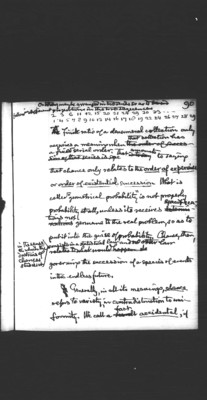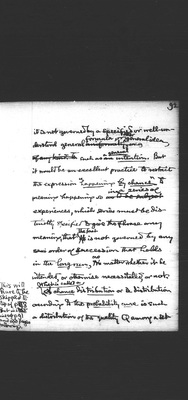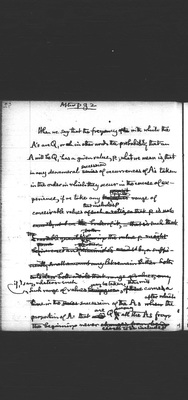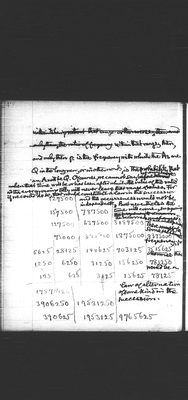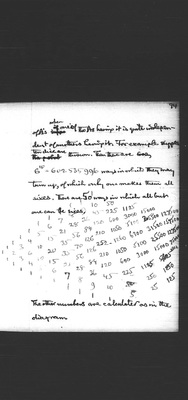Pages
46
90
Or they may be arranged in two series so as to follow in different proportions in the two sequences 2 3 6 11 12 15 20 21 24 29 30 33 . . . 1 4 5 7 8 9 10 13 14 16 17 18 19 22 24 26 27 28 29 A finite ratio of a denumeral collection only acquires a meaning when that collection has a fixed serial order. That amounts to saying that chance only relates to the order of experience or order of existential succession. What is called “geometrical probability” is not properly probability at all, unless it receives specifications not germane to the real problem, so as to put it into the guise of probability. Chance, then, in the sense in which the doctrine of chances studies it consists in a statistical law and no other law governing the succession of a species of events in the endless future.
Generally, in all its meanings, chance refers to variety, in contradistinction to uniformity. We call a fact accidental, if
47
92
it is not governed by a specified or well-understood general formula or other general idea, such as a general intention. But it would be an excellent practice to restrict the expression “happening by chance” to meaning happening so in a series of experiences, which series must be distinctly specified to give the phrase any meaning, that the fact is not governed by any order of succession that holds in the long run, no matter whether it be intended, or otherwise necessitated, or not.
If what is called a chance distribution or a distribution according to the probability curve is such a distribution of the quality Q among a set [marginal note next to this paragraph: “This will have to be skipped to top of p 98 but instead insert p 91 and odd pages following.”]
48
After p 92
When we say that the frequency with which the A's are Q, or in other words the probability that an A will be Q, has a given value, p, what we mean is, that in any denumeral succession of occurrences of A's taken in the order in which they occur in the course of experience, if we take any finite range of conceivable values that includes p . . . if, I say, whatever such range of values may be taken, there will come a time in the succession of the As after which the proportion of As that are Q among all the As from the beginning never ceases to be included
49
within that range, then, and only then p is the frequency with which the As are Q in the long run, or in other words, is the probability that an A will be Q. Of course, we cannot say at any time when that time will be or has been after which the value of the ratio in the evergrowing tally wiil never leave that range of values. For if we could do so, that would constitute a law in the succession and the occurrences would not be independent. But nevertheless the time will come, supposing the occurrences are independent. There must be some ultimate frequency; for otherwise there would be a law of alternation of some kind in the succession.
50
94
of A's when one of the As having it is quite independent of another's having it. For example suppose ten dice are thrown. Then there are 610 = 602535996 ways in which they may turn up, of which only one makes them all sixes. There are 50 ways in which all but one can be sixes. The other numbers are calculated as in the diagram.
